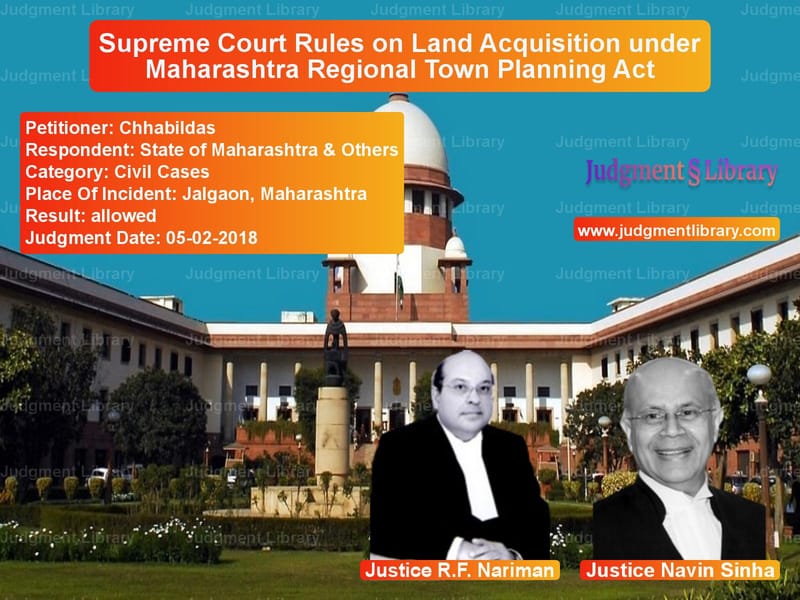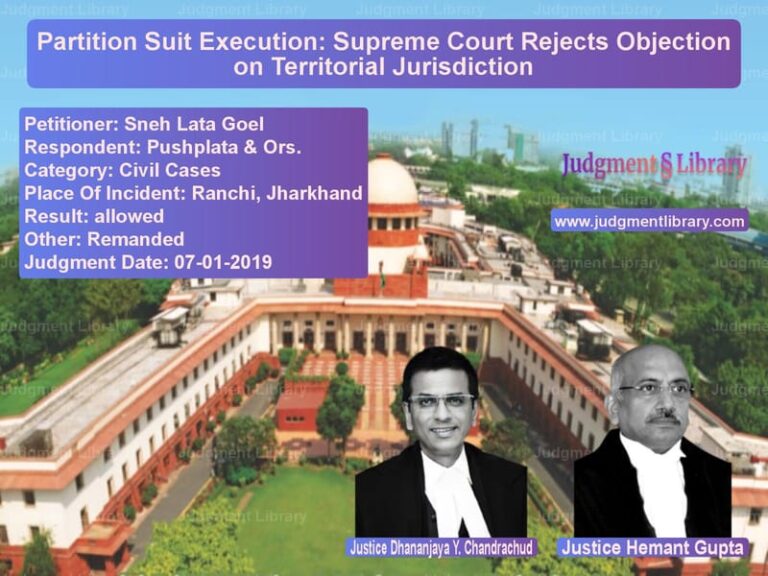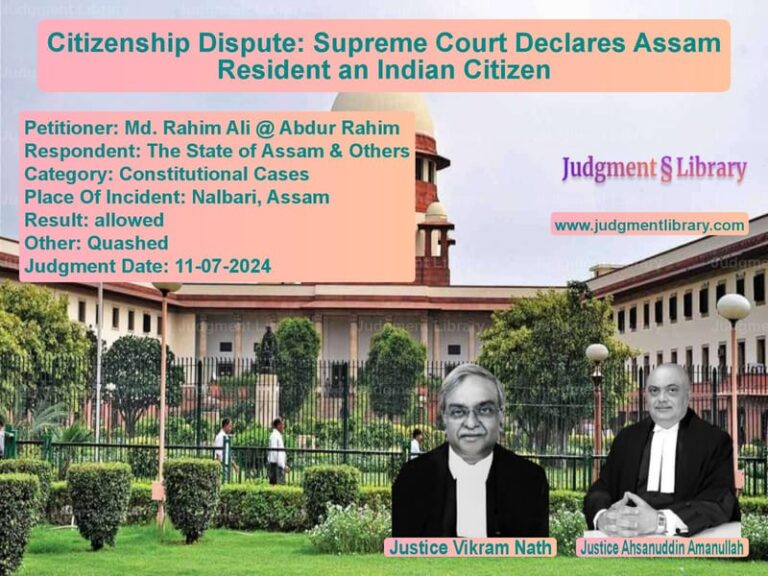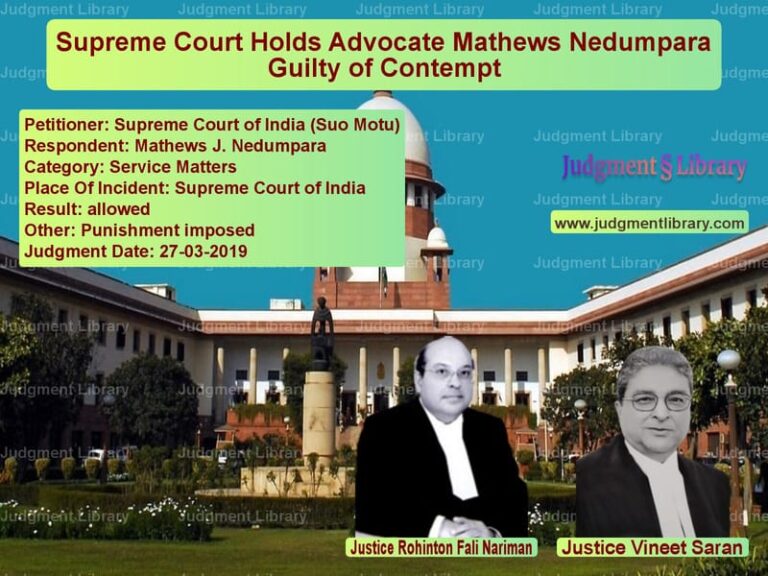Supreme Court Rules on Land Acquisition under Maharashtra Regional Town Planning Act
The Supreme Court of India, in its judgment dated February 6, 2018, addressed the complex issue of land acquisition under the Maharashtra Regional Town Planning Act, 1966 (MRTP Act). The case, Chhabildas vs. The State of Maharashtra & Others, revolved around a dispute concerning the lapse of land reservation due to prolonged inaction by the authorities.
This ruling clarifies how timelines in land acquisition cases must be adhered to and reinforces the rights of landowners under the MRTP Act.
Background of the Case
The dispute began when the appellant, Chhabildas, a landowner in Jalgaon, Maharashtra, found his land designated for public use in a Development Plan sanctioned on February 11, 2002. His land was marked for a primary school and playground.
On May 7, 2007, Chhabildas issued a purchase notice under Section 49(1)(e) of the MRTP Act, claiming that:
- Due to the reservation, he was unable to sell the land at a fair price.
- The prolonged delay in acquisition had deprived him of the right to beneficial use of his land.
On December 12, 2007, the State Government confirmed the purchase notice, stating that acquisition proceedings should be initiated within one year, i.e., before December 12, 2008.
Procedural Timeline and Delays
- On September 26, 2008, the Commissioner of Jalgaon submitted a proposal to acquire the land.
- On January 28, 2009, the Collector appointed a Sub-Divisional Officer (SDO) to oversee the process.
- By 2014, the acquisition process had stalled, prompting the landowner to request the release of his land.
- On March 28, 2014, the Town Planning Authority claimed the acquisition was still “in process.”
With no further progress, Chhabildas filed a writ petition before the Aurangabad Bench of the Bombay High Court in May 2014. However, the High Court dismissed his plea on December 5, 2014, ruling that only Section 127 of the MRTP Act governs lapsing of reservations.
Key Legal Issues
- Does Section 49(7) of the MRTP Act require authorities to acquire land within a fixed timeframe?
- What happens if authorities fail to act within the prescribed period?
- Does inordinate delay justify lapsing of land reservation?
Petitioner’s Arguments (Chhabildas)
The petitioner argued:
“If the government fails to acquire land within one year of confirming a purchase notice, the reservation should lapse.”
He further contended:
- The authorities had failed to complete the acquisition despite the purchase notice being confirmed over 10 years ago.
- The impugned High Court judgment was incorrect in stating that Section 127 alone governs lapsing.
- Section 49 itself provides a clear timeline, and non-compliance should lead to the land being freed from reservation.
Respondent’s Arguments (State of Maharashtra)
The State countered:
“There is no explicit lapse under Section 49. Only Section 127 provides for lapsing, requiring the owner to issue a second purchase notice.”
Further, they argued:
- Since the acquisition process had begun (letters were exchanged), the government had complied with the law.
- Failure to complete the process does not automatically free the land from reservation.
Supreme Court’s Judgment
The Supreme Court ruled in favor of the petitioner, holding that:
“If the appropriate authority fails to acquire land within the stipulated timeframe, the reservation lapses, and the land must be released.”
The Court provided the following clarifications:
- Authorities must acquire land within one year after confirming a purchase notice.
- Failing this, the reservation under the Development Plan automatically lapses.
- Landowners cannot be made to wait indefinitely.
The Court relied on past precedents, including:
- Girnar Traders v. State of Maharashtra (2007) – Emphasized strict adherence to acquisition timelines.
- Shrirampur Municipal Council v. Satyabhamabai Bhimaji Dawkher (2013) – Stressed that mere proposals do not constitute “steps toward acquisition.”
- Hasmukhrai V. Mehta v. State of Maharashtra (2015) – Held that inordinate delay (20 years) renders acquisition invalid.
Implications of the Judgment
- Prevents Land Freezing: Government authorities cannot indefinitely hold land under reservation without acquiring it.
- Strengthens Landowners’ Rights: Provides a clear remedy against delayed acquisition.
- Enforces Time Limits: Ensures that authorities act within one year or release the land.
Conclusion
The Supreme Court’s judgment in Chhabildas vs. State of Maharashtra is a landmark ruling reinforcing timely land acquisition under the MRTP Act. It prevents authorities from indefinitely reserving land without compensating owners and strengthens the principle that inaction leads to lapsing.
This case sets a precedent for future disputes, ensuring that urban planning laws are applied fairly and do not unduly burden landowners.
Petitioner Name: ChhabildasRespondent Name: State of Maharashtra & OthersJudgment By: Justice R.F. Nariman, Justice Navin SinhaJudgment Date: 05-02-2018
Don’t miss out on the full details! Download the complete judgment in PDF format below and gain valuable insights instantly!
Download Judgment: Chhabildas vs State of Maharashtra Supreme Court of India Judgment Dated 05-02-2018.pdf
Direct Downlaod Judgment: Direct downlaod this Judgment
See all petitions in Property Disputes
See all petitions in Landlord-Tenant Disputes
See all petitions in Specific Performance
See all petitions in Judgment by Rohinton Fali Nariman
See all petitions in Judgment by Navin Sinha
See all petitions in allowed
See all petitions in supreme court of India judgments February 2018
See all petitions in 2018 judgments
See all posts in Civil Cases Category
See all allowed petitions in Civil Cases Category
See all Dismissed petitions in Civil Cases Category
See all partially allowed petitions in Civil Cases Category







